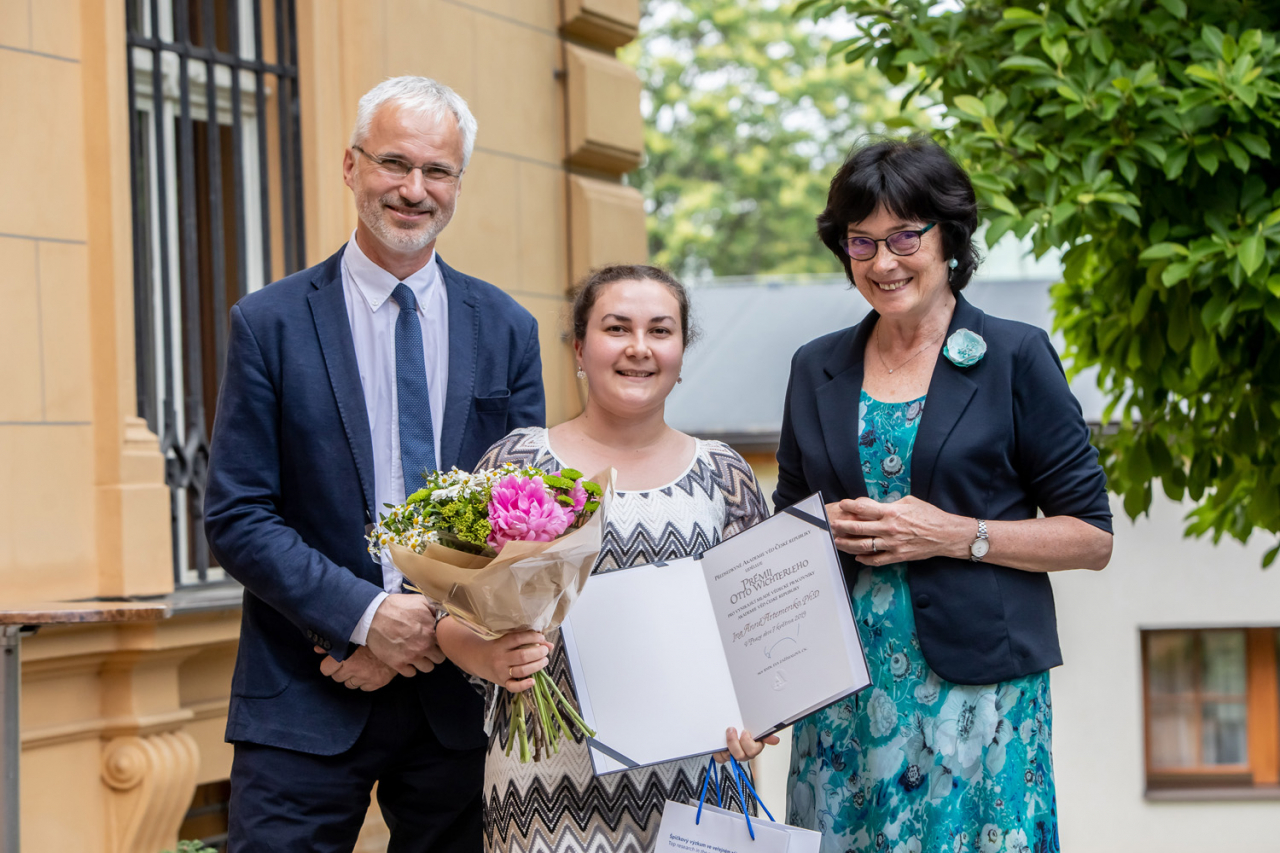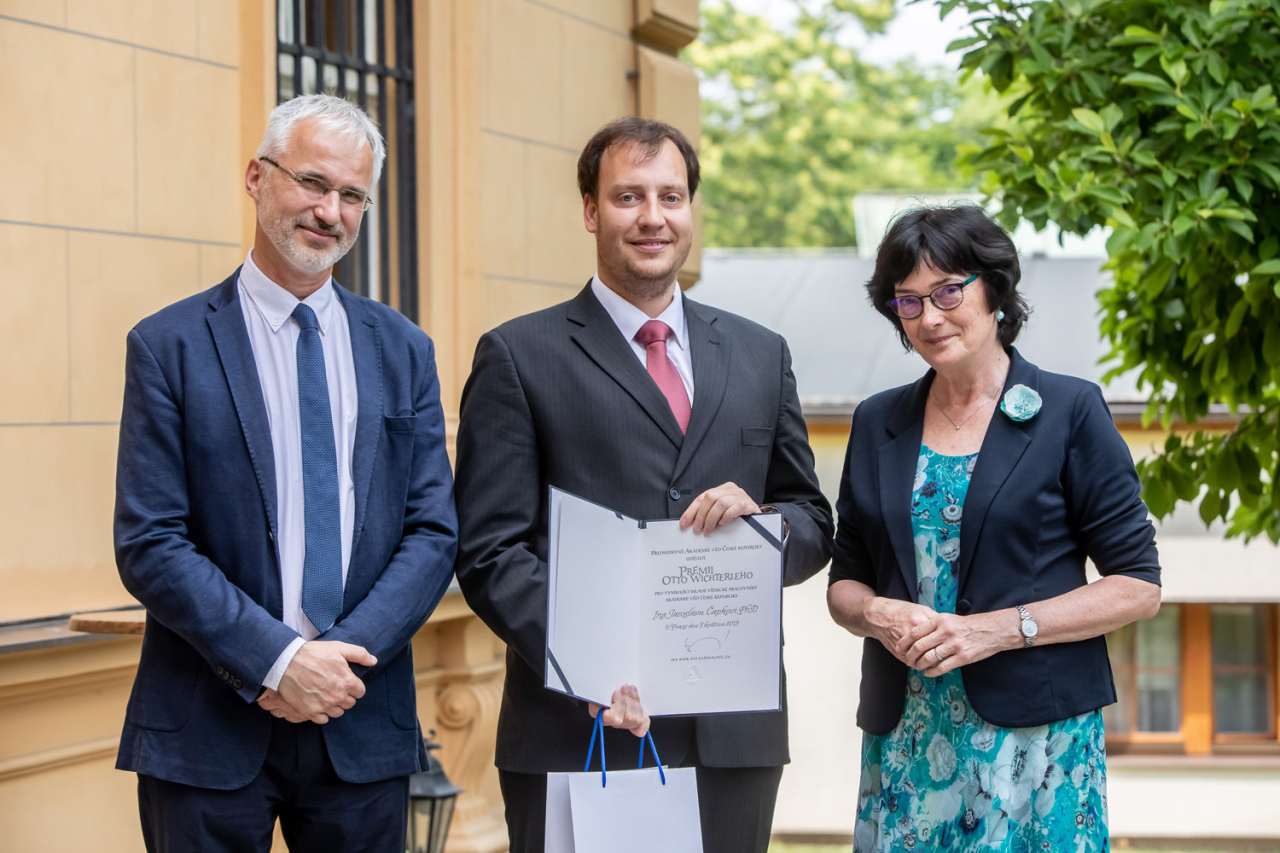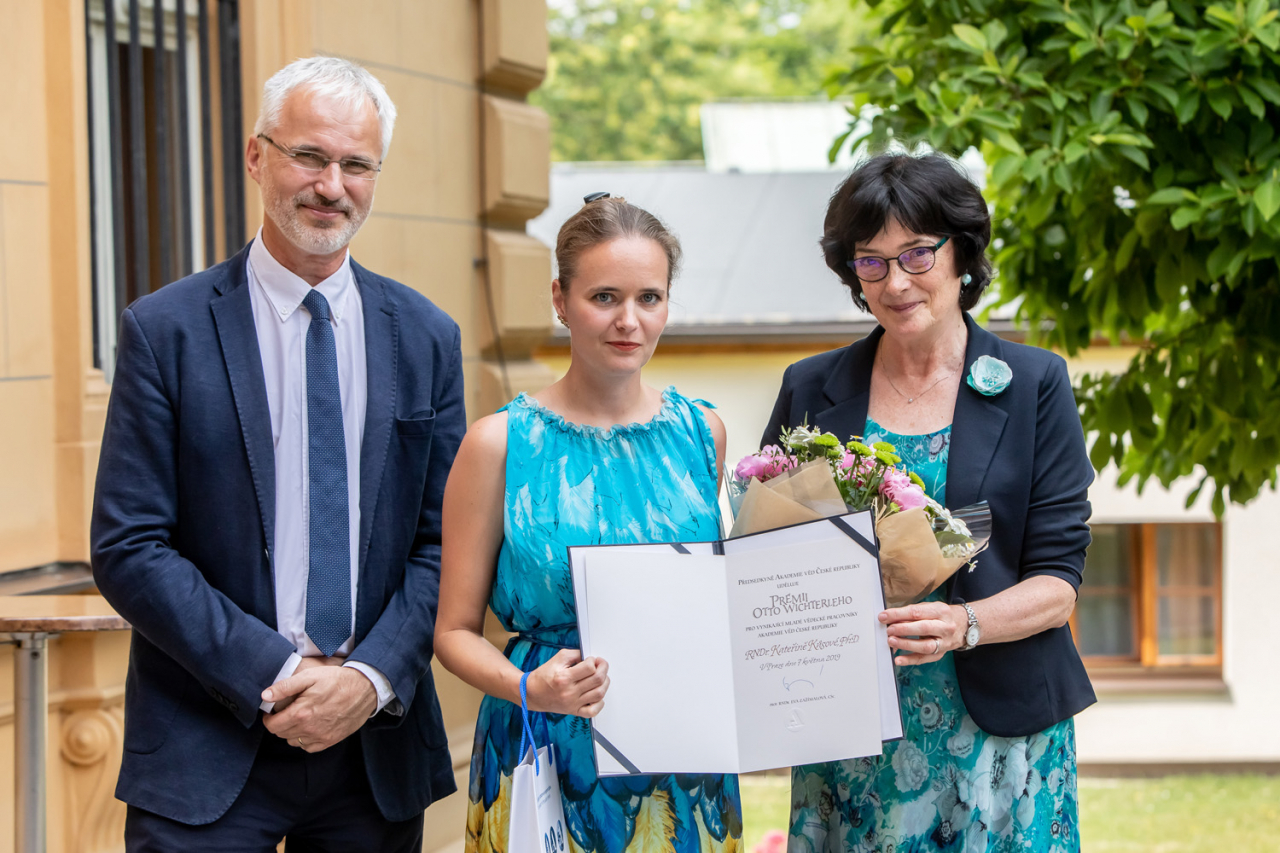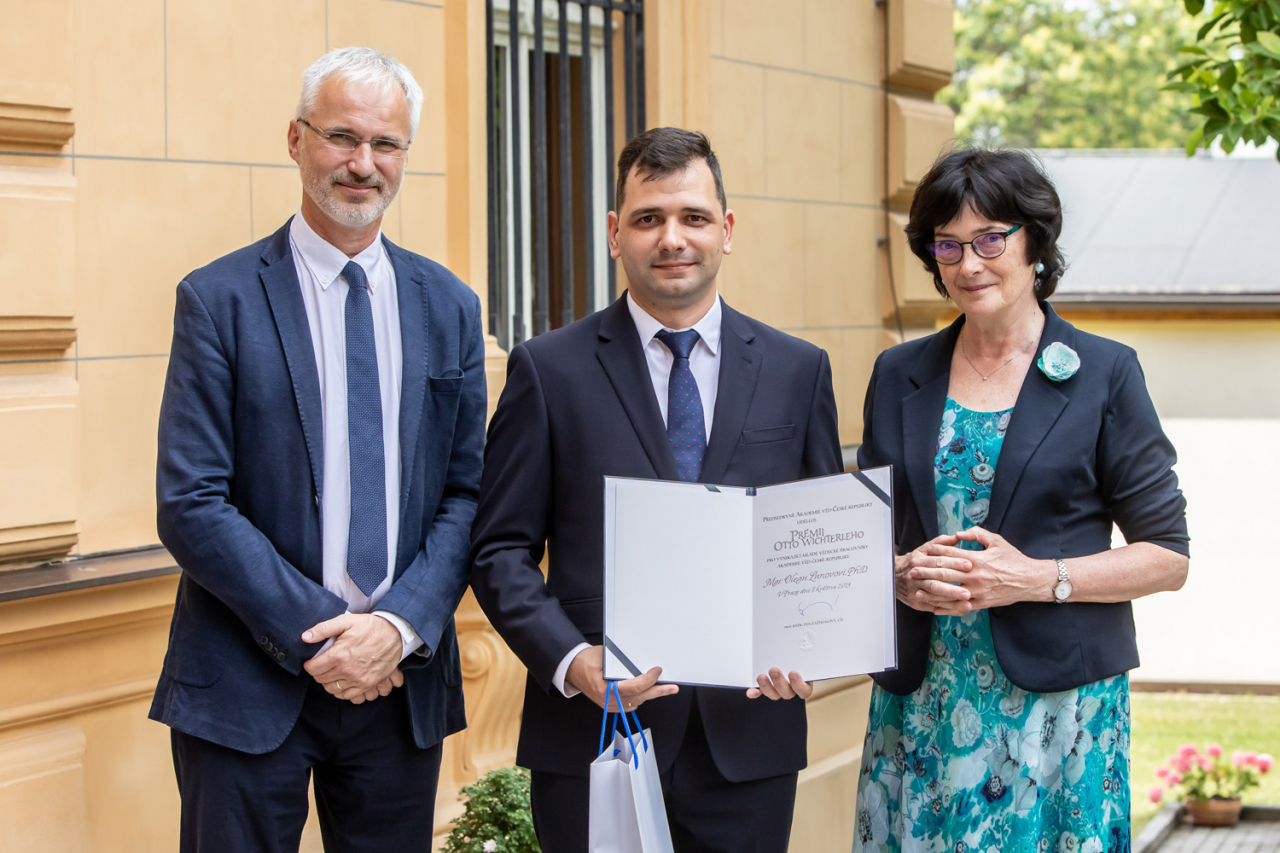Technologické centrum AV ČR, 11.10.2018.
Czech Liaison Office...
A total of twenty-three scientists representing different fields of science received the prize for young talented scientists at a ceremony held at the Lanna Villa on the 19th of June 2019. Five of the prize winners are based at the Institute of Physics (the "FZU") of the Czech Academy of Sciences. The award-winning laureates from FZU are Anna Artemenko, Renann Lipinski Jusinskas, Kateřina Kůsová and Oleg Lunov. The award was handed over by prof. Eva Zažímalová, the President of the Czech Academy of Sciences.
The nomination for the annual Otto Wichterle Premium is intended for outstanding young scientists up to the age of thirty-five employed at the Academy of Sciences who achieved top results in their fields and hold a scientific degree (CSc., Dr., Ph.D., DrSc.). The prize was named after Otto Wichterle, a reknown Czech scientist, recognized primarily for the invention of soft contact lenses and a synthetic fibre silon.
Ing. Anna Artemenko, Ph.D. specializes in material research at the Department of Optical Materials. The main topic of her work is the characterisation of physical properties and the morphology of diamond and carbon layers as well as the study of interactions between their surface and biomolecules. In her work, she mainly uses X-ray photoelectron spectroscopy (XPS) in combination with other methods (e.g. IR and Raman spectroscopy). The potential application of her research lies in biomedicine where diamond and carbon layers may be used for the creation of biosensors.
At the FZU, A. Artemenko has introduced a new technology of plasma-originated polymer application by magnetron sputtering, allowing the deposition of thin polymer layers containing amine groups on diamond surface. This technology has proved highly suitable for the functionalizing of diamond surfaces and for ensuring their maximum biocompatibility in future clinical trials.
A. Artemenko graduated from a PhD programme at the Faculty of Mathematics and Physics at Charles University in Prague. Her excellent results and scientific excellence can be demonstrated by a high number of publications in top international journals (48 publications in impact journals) or by her involvement in international research teams and presentations at international scientific conferences.

A. Artemenko with prof. Zažímalová, the President of CAS, and dr. Fejfar, the deputy director of FZU.
The work of Ing. Jaroslav Čapek, Ph.D. has been associated with the working group for Controlled Microstructure Materials at the Department of Functional Materials. As the group’s member, J. Čapek has concentrated particularly on the microstructure and mechanical properties of metallic materials and their susceptibility to corrosion. A centre of J. Čapek’s interest has been in physical metallurgy and the physics of metallic biomaterials.
J. Čapek graduated from the University of Chemistry and Technology in Prague. As a university student and later as a worker of the Institute of Physics, he displayed complex experimental skills and theoretical knowledge of metallic materials preparation and processing using different procedures and of their characterization. At the FZU, he began to work on the preparation of metallic single crystals and bicrystals with precisely defined structure, the study of deformation mechanisms in metallic materials and the characterization of metallic materials prepared by 3D printing. At the FZU, he has been responsible for the operation of several laboratories.
Currently, J. Čapek studies the impact of thermomechanical processing of biodegradable zinc alloys on their microstructure, mechanical, corrosive and biological properties. He uses advanced analytical techniques, such as scanning electron microscopy, electron backscatter diffraction, transmission electron microscopy and others to address this issue. Additionally, he has been involved in various methods of crystal preparation. Due to the use of advanced equipment for crystal growing, he has been able to actively cooperate with several Czech and foreign scientific facilities.

J. Čapek with prof. Zažímalová, the President of CAS, and dr. Fejfar, the deputy director of FZU.
Dr. Renann Lipinski Jusinskas works at the FZU in the CEICO group. He came at the FZU as a post-doctoral student from the ICTP-SAIFR, the most prestigious theoretical physics facility in Latin America, in 2014. Jusinskas is an expert on supersymmetry in quantum field theory and string theory. Primarily, he concentrates on the development of pure-spinor formalism in string theory and the description of string dynamics using manifestly covariant and supersymmetric methods. He is already considered one of the world’s top experts in the field.
R. L. Jusinskas has published successful articles in the prestigious JHEP journal and his achievements have been praised by the scientific community on several occasions by e.g. selecting him as a reviewer of a summary article in a highly impact Physics Reports journal. In 2019 he was awarded a Junior Grant for "Fundamental Aspects of Superstrings" by the Grant Agency of the Czech Republic. Apart from his successful publishing activities in prestigious expert journals, R. L. Jusinskas has been engaged in the popularisation of theoretical physics both among university students and among the general public. He has participated in lecturing activities and the popularization of physics, e.g. as part of the Science Fair.
Renann Lipinski Jusinskas.
RNDr. Kateřina Kůsová, Ph.D. is in charge of the Silicon Nanophotonics Group at the Department of Thin Films and Nanostructures. As part of her research, K. Kůsová has studied the luminescence of silicon nanoparticles and achieved a number of original results in this field. She discovered that the mechanical strain combined with the quantum confinement in silicon nanocrystals leads to the formation of an electron band structure with fundamental direct forbidden band gap. This discovery has a wide range of potential applications such as the integration of miniature light sources on silicon chips or the use of silicon nanoparticles in biology and medicine.
In 2014, K. Kůsová became a laureate of the prestigious L’Oréal Scholarship for Female Scientists and received an award from the president of the Czech Grant Agency in 2016. She has authored a European patent and co-organized a successful symposium at the conference of European Materials Research Society. She is known for her extensive publication activity and is a popular lecturer.

K. Kůsová with prof. Zažímalová, the President of CAS, and dr. Fejfar, the deputy director of FZU.
Mgr. Oleg Lunov, Ph.D. works at the Department of Optical and Biophysical Systems of the FZU where he leads the Laboratory of Biophysics. O. Lunov received his Ph.D. at the University of Ulm in Germany. He joined the FZU in 2014 as a J. E. Purkyně Fellowship awardee. This young scientist has significantly expanded the research potential of his department by launching a completely new research direction for modern microscopic methods and by establishing a new Biophysics Laboratory.
Lunov's research group has developed a unique accessory for quantitative fluorescence microscopy enabling specialized time-resolved fluorescence measurements in a confocal laser microscope. These research activities have enabled a unique combination of material research and biomedicine.
O. Lunov achieved international recognition for his results in both the basic and applied research, in particular in his study of the effects of different physical conditions on cellular processes. His approach has earned him explicit acknowledgement and respect in the scientific community and popularity among students. Additionally, O. Lunov has been successful in the teaching field - as the trainer of PhD students and a mentor for student theses.

O. Lunov with prof. Zažímalová, the President of CAS, and dr. Fejfar, the deputy director of FZU.